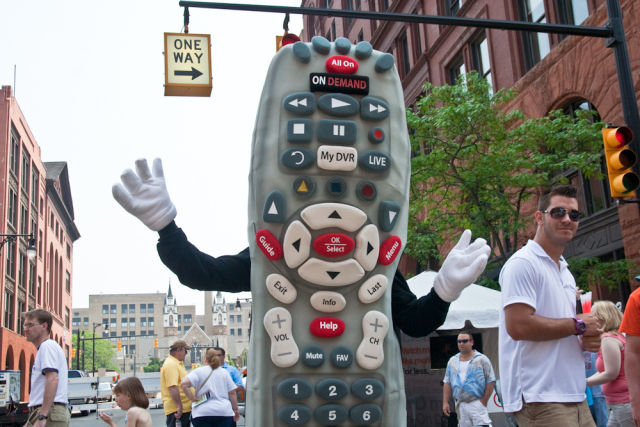BigStar
Stop chasing
- Messages
- 11,528
- Reaction score
- 17,081
Cable lobby is really mad about FCC’s set-top box competition plan
Cable box rental fee revenue at stake in battle over new rules.
http://arstechnica.com/business/201...-mad-about-fccs-set-top-box-competition-plan/
by Jon Brodkin - Jan 28, 2016 11:33am EST
171

Steven Depolo
Cable TV industry lobby groups expressed their displeasure with a Federal Communications Commission plan to bring competition to the set-top box market, which could help consumers watch TV on different devices and thus avoid paying cable box rental fees.
FCC Chairman Tom Wheeler proposed new rules that would force pay-TV companies to give third parties access to TV content, letting hardware makers build better set-top boxes. Customers would be able to watch all the TV channels they're already paying cable companies for, but on a device that they don't have to rent from them. The rules could also bring TV to tablets and other devices without need for a rented set-top box. The system would essentially replace CableCard with a software-based equivalent.

Ignoring cable industry protest, FCC says it will “unlock the set-top box”
Cable TV customers could save a lot of money on set-top box rental fees.
Cable companies hate the plan.
"The proposal, like prior federal government technology mandates, would impose costs on consumers, adversely impact the creation of high-quality content, and chill innovation," Comcast wrote. "It also flies in the face of the rapid changes that are occurring in the marketplace and benefitting consumers."
There are already apps that bring TV networks to various devices, so the new mandate is "unnecessary and backwards looking," the National Cable & Telecommunications Association (NCTA), the biggest cable lobby group, wrote yesterday.
"By forcing new government mandates on network providers and content creators, the FCC may intend to reward Google [a supporter of the proposal] handsomely, but in the process it will ignore contractual freedoms, weaken content diversity and security, undermine important consumer protections like privacy, and stall the creative and technical innovation that is driving positive changes in today’s TV marketplace," NCTA wrote. "Despite these significant shortcomings, it looks like the FCC is attempting to move forward with a technology mandate that would replace app innovation with government regulation."
The NCTA further claimed that the plan will "force programmers and TV providers to dismantle their shows and services for companies to repackage, reuse, and exploit as they see fit and without paying for the content" and force customers to buy additional hardware. It would benefit tech companies that "want to sell you an access device that you don’t need in order to give you content you already receive," the group said.
FCC: Cable companies are wrong
FCC officials dispute these arguments, saying that customers who are happy with the status quo can keep using their current set-top boxes without buying anything else. But those who want could stop renting set-top boxes and instead use different devices, the FCC argues. About 99 percent of customers still rent set-top boxes directly from Multichannel Video Programming Distributors (MVPDs), and pay an average of $231.82 a year in rental fees, for a total of $19.5 billion a year, US senators found in a survey of pay-TV providers last year last year.
The FCC's proposed rules include copyright protections, so consumers would still only be able to view content that they pay cable companies to access. The FCC also said that device makers and software developers will have to follow consumer privacy rules. The proposal would affect all pay-TV companies, including cable, satellite, and telecom operators.
The American Cable Association (ACA), which represents smaller cable companies, also criticized the FCC. "ACA is especially troubled by the agency's one-size-fits-all approach that will disproportionately burden smaller cable operators," group CEO Matthew Polka said.
Many ACA members already deploy TiVo set-top boxes, which integrate Netflix and other online services with traditional pay-TV content, Polka said. "The FCC's experience with the CableCard, a costly failure recognized by the FCC itself, suggests that some humility is in order when the justification for government intervention seems at best tenuous amid so much head-spinning change occurring in the multichannel pay-TV environment," he said.
Another FCC opponent is Free State Foundation President Randolph May. As we reported yesterday, May argues that the FCC plan would violate cable companies' First Amendment free speech rights. May expanded on his argument in an e-mail to Ars, saying that "the government is going to end up dictating the way the menus are presented to avoid ‘discrimination' against non-MVPDs. And it's going to dictate, of course, that non-MVPDs have ‘equal’ access to the menus. These are requirements that prescribe content—which the government cannot do absent a compelling interest. I understand the FCC will claim a compelling interest in defending its mandates, but in light of the market developments and alternatives consumers have, I don’t think the courts—and ultimately, the Supreme Court should it be called upon to decide—will agree with the FCC.”
Opponents calling themselves the "Future of TV Coalition" are trying to convince customers to sign a petition urging the FCC to drop its plan. The coalition includes Arris, AT&T, Cablevision, Cisco, Comcast, Cox, Dish, Time Warner Cable, USTelecom, and others.
“Time to eliminate this $20 billion boondoggle”
The FCC does have support from consumer advocacy groups, some technology companies, and Democratic members of Congress.
“Set-top boxes are a clunky piece of equipment that pay-TV customers are cornered into renting for hundreds of dollars a year in order to view their programming. And the average cost to rent their set-top box has risen a staggering 185 percent over the last 20 years," US Rep. Anna Eshoo (D-Calif.) said. “Think back to the days when Ma Bell required customers to only rent their phones from them. When the FCC lifted this prohibition, consumers not only saved money, but innovation thrived in the telephone market. It’s time to eliminate this $20 billion boondoggle and leapfrog into the second decade of the 21st century and all it has to offer.”
Cable box rental fee revenue at stake in battle over new rules.
http://arstechnica.com/business/201...-mad-about-fccs-set-top-box-competition-plan/
by Jon Brodkin - Jan 28, 2016 11:33am EST
171

Steven Depolo
Cable TV industry lobby groups expressed their displeasure with a Federal Communications Commission plan to bring competition to the set-top box market, which could help consumers watch TV on different devices and thus avoid paying cable box rental fees.
FCC Chairman Tom Wheeler proposed new rules that would force pay-TV companies to give third parties access to TV content, letting hardware makers build better set-top boxes. Customers would be able to watch all the TV channels they're already paying cable companies for, but on a device that they don't have to rent from them. The rules could also bring TV to tablets and other devices without need for a rented set-top box. The system would essentially replace CableCard with a software-based equivalent.

Ignoring cable industry protest, FCC says it will “unlock the set-top box”
Cable TV customers could save a lot of money on set-top box rental fees.
Cable companies hate the plan.
"The proposal, like prior federal government technology mandates, would impose costs on consumers, adversely impact the creation of high-quality content, and chill innovation," Comcast wrote. "It also flies in the face of the rapid changes that are occurring in the marketplace and benefitting consumers."
There are already apps that bring TV networks to various devices, so the new mandate is "unnecessary and backwards looking," the National Cable & Telecommunications Association (NCTA), the biggest cable lobby group, wrote yesterday.
"By forcing new government mandates on network providers and content creators, the FCC may intend to reward Google [a supporter of the proposal] handsomely, but in the process it will ignore contractual freedoms, weaken content diversity and security, undermine important consumer protections like privacy, and stall the creative and technical innovation that is driving positive changes in today’s TV marketplace," NCTA wrote. "Despite these significant shortcomings, it looks like the FCC is attempting to move forward with a technology mandate that would replace app innovation with government regulation."
The NCTA further claimed that the plan will "force programmers and TV providers to dismantle their shows and services for companies to repackage, reuse, and exploit as they see fit and without paying for the content" and force customers to buy additional hardware. It would benefit tech companies that "want to sell you an access device that you don’t need in order to give you content you already receive," the group said.
FCC: Cable companies are wrong
FCC officials dispute these arguments, saying that customers who are happy with the status quo can keep using their current set-top boxes without buying anything else. But those who want could stop renting set-top boxes and instead use different devices, the FCC argues. About 99 percent of customers still rent set-top boxes directly from Multichannel Video Programming Distributors (MVPDs), and pay an average of $231.82 a year in rental fees, for a total of $19.5 billion a year, US senators found in a survey of pay-TV providers last year last year.
The FCC's proposed rules include copyright protections, so consumers would still only be able to view content that they pay cable companies to access. The FCC also said that device makers and software developers will have to follow consumer privacy rules. The proposal would affect all pay-TV companies, including cable, satellite, and telecom operators.
The American Cable Association (ACA), which represents smaller cable companies, also criticized the FCC. "ACA is especially troubled by the agency's one-size-fits-all approach that will disproportionately burden smaller cable operators," group CEO Matthew Polka said.
Many ACA members already deploy TiVo set-top boxes, which integrate Netflix and other online services with traditional pay-TV content, Polka said. "The FCC's experience with the CableCard, a costly failure recognized by the FCC itself, suggests that some humility is in order when the justification for government intervention seems at best tenuous amid so much head-spinning change occurring in the multichannel pay-TV environment," he said.
Another FCC opponent is Free State Foundation President Randolph May. As we reported yesterday, May argues that the FCC plan would violate cable companies' First Amendment free speech rights. May expanded on his argument in an e-mail to Ars, saying that "the government is going to end up dictating the way the menus are presented to avoid ‘discrimination' against non-MVPDs. And it's going to dictate, of course, that non-MVPDs have ‘equal’ access to the menus. These are requirements that prescribe content—which the government cannot do absent a compelling interest. I understand the FCC will claim a compelling interest in defending its mandates, but in light of the market developments and alternatives consumers have, I don’t think the courts—and ultimately, the Supreme Court should it be called upon to decide—will agree with the FCC.”
Opponents calling themselves the "Future of TV Coalition" are trying to convince customers to sign a petition urging the FCC to drop its plan. The coalition includes Arris, AT&T, Cablevision, Cisco, Comcast, Cox, Dish, Time Warner Cable, USTelecom, and others.
“Time to eliminate this $20 billion boondoggle”
The FCC does have support from consumer advocacy groups, some technology companies, and Democratic members of Congress.
“Set-top boxes are a clunky piece of equipment that pay-TV customers are cornered into renting for hundreds of dollars a year in order to view their programming. And the average cost to rent their set-top box has risen a staggering 185 percent over the last 20 years," US Rep. Anna Eshoo (D-Calif.) said. “Think back to the days when Ma Bell required customers to only rent their phones from them. When the FCC lifted this prohibition, consumers not only saved money, but innovation thrived in the telephone market. It’s time to eliminate this $20 billion boondoggle and leapfrog into the second decade of the 21st century and all it has to offer.”


